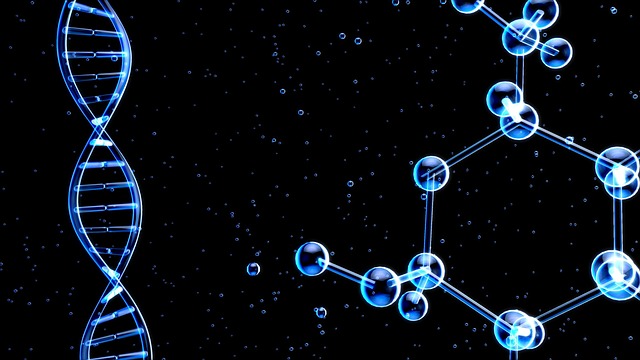NAD+, a coenzyme crucial for cell health and energy production, shows potential in cellular rejuvenation. By participating in DNA repair and gene expression, NAD+ levels naturally decline with age, leading to reduced energy and increased oxidative stress. Boosting NAD+ through supplements or therapy enhances DNA repair processes, mitigates cellular damage, and offers promise for anti-aging benefits, particularly in conditions linked to DNA damage. However, safe application requires careful consideration and professional assessment due to the nascent nature of NAD+ therapy.
“Unveil the potential of NAD+ therapy for cellular rejuvenation and anti-aging. This powerful coenzyme plays a pivotal role in maintaining cell health and DNA integrity. In this comprehensive guide, we explore who can benefit from NAD+ treatments, focusing on targeting DNA damage and its anti-aging effects. From understanding the science behind NAD+ to considering safety aspects, discover why this natural process is becoming a game-changer for those seeking cellular rejuvenation.”
Understanding NAD+ and Its Role in Cell Health
NAD+, or nicotinamide adenine dinucleotide, is a coenzyme found in all living cells, playing a crucial role in cellular metabolism and energy production. Beyond its traditional function, NAD+ has emerged as a key player in cell health and longevity for several reasons. It acts as a co-factor to sirtuins, a family of proteins involved in DNA repair, stress response, and gene expression. By supporting these cellular mechanisms, NAD+ contributes to maintaining genomic stability and optimal cell function.
As we age, NAD+ levels naturally decrease, leading to reduced cellular energy production and increased oxidative stress. This decline can exacerbate age-related damage, including DNA mutations and mitochondrial dysfunction. Thus, boosting NAD+ levels through therapy, such as NAD+ supplementation or activation, presents a promising strategy for NAD+ for cellular rejuvenation. By promoting efficient DNA repair processes and reducing cellular wear and tear, enhancing NAD+ levels may hold the key to supporting anti-aging efforts from within.
Targeting DNA Damage: Who Benefits from NAD+ Therapy?
DNA damage accumulates over time, contributing to aging and various age-related conditions. NAD+ (nicotinamide adenine dinucleotide), a coenzyme crucial for cellular energy production, plays a pivotal role in DNA repair mechanisms. Research suggests that boosting NAD+ levels through therapy may benefit individuals with elevated DNA damage, including those facing signs of premature aging.
This is particularly relevant for people struggling with conditions like skin aging, cognitive decline, or metabolic disorders, where DNA damage is often a contributing factor. By supporting efficient DNA repair processes, NAD+ therapy for cellular rejuvenation holds promise in mitigating the effects of aging and promoting overall health and vitality.
Anti-Aging Strategies: Is NAD+ the New Secret?
In the quest for healthy aging, scientists and researchers are constantly exploring new avenues, and one compound that has garnered significant attention is NAD+, or Nicotinamide Adenine Dinucleotide. Often referred to as the “energy currency” of cells, NAD+ plays a pivotal role in various cellular processes, including DNA repair and metabolism. As we age, our natural levels of NAD+ tend to decrease, leading many to wonder if replenishing it could be a game-changer in anti-aging strategies.
The potential of NAD+ for cellular rejuvenation is becoming increasingly evident. Numerous studies suggest that boosting NAD+ levels can enhance DNA repair mechanisms, protect against cellular damage, and improve overall cellular function. This makes NAD+ therapy an intriguing prospect for those seeking to slow down the aging process and promote longevity. Whether it’s through dietary supplements or innovative medical procedures, exploring the benefits of NAD+ could very well be a promising step forward in the world of anti-aging science.
Safety and Considerations for NAD+ Treatment
NAD+ therapy, while promising for cellular rejuvenation and anti-aging, should be approached with careful consideration due to its nascent status in medical application. Safety is paramount, as any therapeutic intervention carries potential risks and side effects, even when utilizing naturally occurring compounds like NAD+. Clinical trials are ongoing, providing valuable insights into the optimal dosages, delivery methods, and candidate profiles most suitable for NAD+ treatment.
The suitability of NAD+ therapy extends to individuals with specific health conditions that may benefit from enhanced DNA repair mechanisms, such as those experiencing premature aging disorders or facing the detrimental effects of chronic stress and poor lifestyle choices. However, it’s crucial for prospective candidates to consult with healthcare professionals who can assess their individual needs, medical history, and potential interactions with existing treatments, ensuring a safe and effective NAD+ therapy regimen tailored specifically for them.
NAD+ therapy presents a promising avenue for individuals seeking enhanced DNA repair mechanisms and anti-aging benefits. With its pivotal role in cell health, targeting specific forms of DNA damage, and potential as an anti-aging strategy, NAD+ for cellular rejuvenation is gaining traction. However, safety considerations must be taken into account to ensure optimal outcomes without adverse effects. Those interested in exploring NAD+ therapy should consult healthcare professionals to determine if this innovative treatment aligns with their individual health goals and needs.
